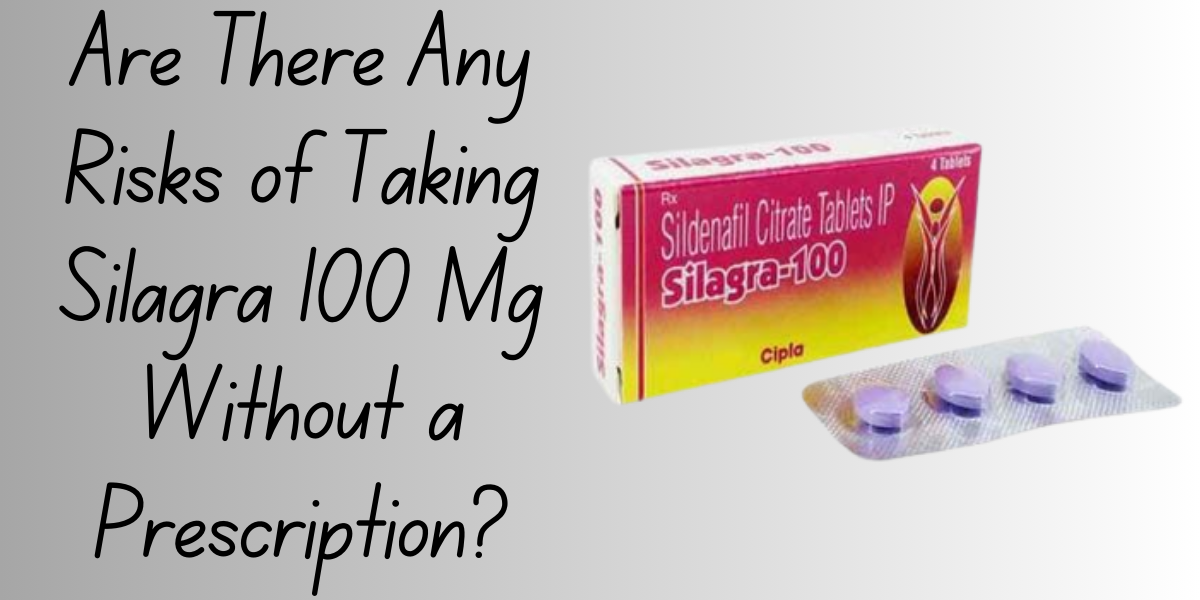Silagra 100 mg, a popular medication containing Sildenafil Citrate, is widely used to treat erectile dysfunction (ED). It has gained considerable attention due to its effectiveness in helping men regain sexual function. However, in recent years, more people have been purchasing Silagra without a prescription, often ordering it online or from unregulated sources. While it might seem like a convenient solution, taking Silagra 100 without proper medical supervision carries several risks that everyone should be aware of. In this article, we will explore the potential dangers of using Silagra 100 mg without a prescription and why consulting a healthcare provider is crucial.
What is Silagra 100 mg?
Silagra 100 mg is a generic form of Sildenafil Citrate, the active ingredient also found in Viagra. It belongs to a class of drugs known as PDE5 inhibitors. These medications work by increasing blood flow to the penis, helping to achieve and maintain an erection suitable for sexual activity. Silagra is manufactured by Cipla, a reputable pharmaceutical company, and is commonly prescribed for men suffering from erectile dysfunction.
When taken correctly, Silagra can significantly improve the quality of life for men with ED. It is usually taken about 30 minutes to an hour before sexual activity and is effective for up to four to six hours. Despite its benefits, Silagra is a prescription medication because it requires careful dosing and medical oversight to ensure safety.
Why Do People Take Silagra Without a Prescription?
Several factors contribute to the growing trend of using Silagra without a prescription. For many, embarrassment or stigma around sexual health issues discourages them from visiting a doctor. Additionally, Silagra is easily available online, often marketed as a quick fix with minimal hassle. Some individuals assume that because Sildenafil Citrate is well-known, it must be safe to take without professional guidance.
Others may misuse Silagra for recreational purposes or performance enhancement even without experiencing ED symptoms. This misuse can lead to serious health complications, which are often underestimated.
Medical Risks of Taking Silagra Without a Prescription
Incorrect Dosage
One of the most significant risks of self-medicating with Silagra is taking the wrong dose. The standard 100 mg dose might be too high for some individuals, especially those with underlying health issues or those taking medications that interact with Sildenafil. Overdosing can cause prolonged and painful erections, a condition called priapism, which requires immediate medical attention to avoid permanent damage.
On the other hand, taking too little might render the medication ineffective, leading to frustration and repeated misuse, which can cause other complications.
Drug Interactions
Silagra 100mg interacts dangerously with certain medications, especially nitrates (used for chest pain), some blood pressure medications, and certain antiviral drugs. When combined, these interactions can lead to a severe drop in blood pressure, fainting, heart attack, or stroke. Without a prescription, users may not be aware of these critical contraindications, putting their lives at risk.
Undiagnosed Medical Conditions
Erectile dysfunction can sometimes be a warning sign of more serious health issues, such as cardiovascular disease, diabetes, or hormonal imbalances. Taking Silagra without consulting a healthcare provider may mask these symptoms and delay necessary medical diagnosis and treatment. This delay could lead to worsened health outcomes and missed opportunities for early intervention.
Side Effects and Allergic Reactions
While generally safe when used correctly, Silagra can cause side effects such as headaches, flushing, indigestion, nasal congestion, and visual disturbances like blurred vision or a blue tint. More severe reactions, although rare, include sudden hearing loss, heart attack, or stroke. Allergic reactions, though uncommon, may cause swelling, rash, or difficulty breathing, requiring immediate medical attention.
Without a doctor’s guidance, users may not recognize the seriousness of these symptoms or know how to respond.
Legal and Ethical Concerns
In many countries, Silagra and other Sildenafil-based medications are regulated and require a prescription. Buying these drugs without a prescription from unregulated online pharmacies is illegal and potentially unsafe. These sources may sell counterfeit or contaminated products, which could be ineffective or harmful.
Psychological and Emotional Risks
Using Silagra without medical advice can lead to psychological dependence, where individuals rely on the drug to feel confident during sexual activity. This dependence may worsen anxiety or erectile dysfunction if the underlying causes are psychological rather than physiological. Furthermore, secretive or improper use can strain intimate relationships, especially if partners are unaware of the medication use.
The Importance of Consulting a Healthcare Provider
Seeing a doctor before taking Silagra is essential for safe and effective treatment. A healthcare provider can evaluate the underlying causes of ED, check for contraindications, recommend the appropriate dosage, and monitor side effects. They may also suggest alternatives, including lifestyle changes, therapy, or other medications, tailored to individual needs.
Safe Alternatives to Unprescribed Use
If visiting a doctor in person is challenging due to stigma or convenience, telehealth services offer a confidential and safe way to obtain a prescription and medical advice. Additionally, lifestyle modifications such as regular exercise, a balanced diet, stress management, and quitting smoking can significantly improve erectile function.
Conclusion
While Silagra 100 mg can be an effective treatment for erectile dysfunction, taking it without a prescription carries substantial risks, including incorrect dosing, dangerous drug interactions, missed diagnosis of serious health conditions, side effects, and legal issues. The best approach is to consult a healthcare professional who can ensure the medication is safe, appropriate, and used correctly. Prioritizing safety and professional guidance will lead to better health outcomes and a more satisfying and secure experience.





Comments